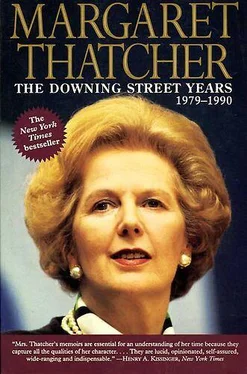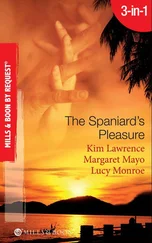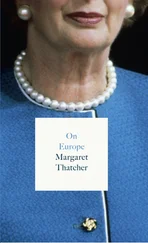The prime minister’s private secretaries, headed by the principal private secretary, are crucial to the effective conduct of government. They are the main channel of communication between the prime minister and the rest of Whitehall, and they bear a heavy burden of responsibility. I was fortunate to have a succession of superb principal private secretaries over the years. Other private secretaries, specializing in economic or foreign affairs, also quickly acquired judgement, expertise and a knowledge of my thinking which allowed me to rely on them. Bernard Ingham, my press secretary, who arrived five months after I became Prime Minister, was another indispensable member of the team. I was told that Bernard’s politics had been Labour, not Conservative: but the first time we met I warmed to this tough, blunt, humorous Yorkshireman. Bernard’s outstanding virtue was his total integrity. An honest man himself, he expected the same high standards from others. He never let me down.
The hours at No. 10 are long. I never minded this. There was an intensity about the job of being Prime Minister which made sleep seem a luxury. In any case, over the years I had trained myself to do with about four hours a night. The Private Office too would often be working till 11 o’clock at night. We were so few that there was no possibility of putting work on someone else’s desk. This sort of atmosphere helps to produce a remarkably happy team, as well as a formidably efficient one. People are under great pressure, and there is no time for trivia. All the effort has to go into getting the work done. Mutual respect and friendly relations are often the result. This feature of No. 10 shapes people’s attitudes not only towards each other but towards the prime minister whom they all directly or indirectly serve. The cheers and clapping when a new prime minister arrives may perhaps be a traditional formality. But the tears and regrets when the outgoing prime minister makes his or her final departure are usually genuine.
Of course, I had visited No. 10 when I served as Education Secretary in Ted Heath’s Government of 1970–4 and, indeed, before that as a Parliamentary Secretary to the Minister of Pensions in Harold Macmillan’s and Alec Douglas-Home’s Governments. So I knew that the house is much larger than it looks from the outside because it is, in fact, two houses, one situated behind the other, joined by passages, with an extra wing linking the two buildings. But although familiar with the reception rooms and the Cabinet Room, I knew little of the rest of the building.
Number Ten is more than an office: it is intended to serve as the prime minister’s home. I never had any doubt that when the Callaghans had left I would move into the prime minister’s small flat at the top of the building. Every practical consideration suggested it, as well as my own taste for long hours of work. As we used to say, harking back to my girlhood in Grantham, I liked living over the shop. I was not able to move out of the house in Flood Street where my family had been living for the last ten years until the first week of June. But from then, until November 1990, Downing Street and Chequers were the twin centres of my personal and professional life.
The flat at No. 10 quickly became a refuge from the rest of the world, though on occasion a good deal of business was done there too. It was right at the top of the building — up in the rafters, in fact. But that was an advantage, for the stairs provided me with about the only real exercise I got. There were plenty of cupboards and a box room in which to dump everything until it found a more permanent place and into which piles of books and papers could be pushed when visitors were due.
Denis and I decided that we would not have any living-in domestic help. No housekeeper could possibly have coped with the irregular hours. When I had no other engagement, I would go up to the flat for a quick lunch of salad or poached egg on Bovril toast. But usually it was 10 or 11 o’clock at night when I would go into the kitchen and prepare something — we knew every way in which eggs and cheese could be served and there was always something to cut at in the fridge — while Denis poured me a night-cap.
The deep freeze was always kept well stocked and the microwave, when it appeared, did sterling work when sudden meals were required because we were working late into the night on a speech, a statement or decisions required for the Falklands campaign or the Libyan raid — or Resolutions at the UN Security Council. On these occasions we used the small dining-room in the flat, which was next to the even smaller kitchen; secretaries from the Political Office, not paid by the taxpayer, would always lend a hand.
Prime Minister or not, I never forgot that I was also MP for Finchley; nor, indeed, would I have wanted to. My monthly surgeries in the constituency and the correspondence which was dealt with from within No. 10 by my secretary, Joy Robilliard (who had been Airey Neave’s secretary until his death), kept me directly in touch with people’s worries. I always had the benefit of a first-class constituency agent and a strongly supportive constituency chairman, which as any MP knows makes a world of difference. I also kept up my own special interests which had been developed as a result of constituency work, for example as patron of the North London Hospice.
I could never have been Prime Minister for more than eleven years without Denis at my side. Always a powerful personality, he had very definite ideas about what should and should not be done. He was a fund of shrewd advice and penetrating comment. And he very sensibly saved these for me rather than the outside world, always refusing to give interviews. He never had a secretary or public relations adviser but answered between thirty and fifty letters every week in his own hand. With the appearance of the ‘Dear Bill’ letters in Private Eye he seemed to become half the nation’s favourite correspondent.
Denis shared my own fascination with politics — that, of course, is how we first met — but he also had his own outside interests, not least sport. He was passionately interested in rugby football — having indeed been a referee. He was also heavily involved in charities, an active member of the Sports Aid Foundation and of the Lord’s Taverners. Denis delivered many speeches on his favourite (nonpolitical) subjects. The one which for me best summed up his character and convictions was on sport and ethics and contained these lines:
The desire to win is born in most of us. The will to win is a matter of training. The manner of winning is a matter of honour.
Although Denis had a deep interest in everything military, and by choice would have stayed in the army at the end of the Second World War, the unexpected death of his father left him with no option but to return to run the family business, a paint and chemicals company. I am glad he did. For his industrial experience was invaluable to me. Not only was he familiar with the scientific side (something which we had in common); he was also a crack cost and management accountant. Nothing escaped his professional eye — he could see and sense trouble long before anyone else. His knowledge of the oil industry also gave me immediate access to expert advice when in 1979 the world experienced the second sudden oil price increase. Indeed, through him and our many friends I was never out of touch with industry and commerce.
Being prime minister is a lonely job. In a sense, it ought to be: you cannot lead from the crowd. But with Denis there I was never alone. What a man. What a husband. What a friend.
In some ways 10 Downing Street is an unusual sort of home. Portraits, busts and sculptures of one’s prime ministerial predecessors remind one of the nearly 250 years of history into which one has stepped.
Читать дальше












